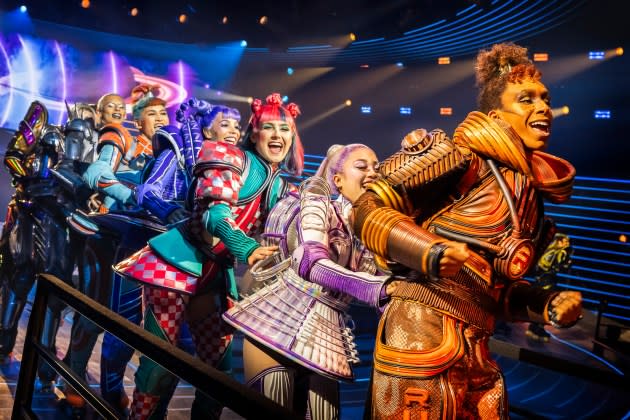’Starlight Express’ Review: Wobbly Revival of Andrew Lloyd Webber’s Roller-Skating Musical Never Hits Stride

Is it a musical? Is it a roller derby? Is it a game-show? When the roller-skating phenomenon that is “Starlight Express” opened in London in 1984 it was all of those and more, as evidenced by its 18-year run. It lasted just 22 months on Broadway but in a uniquely created theater in Bochum, Germany, it has just entered its 37th year. Might North London’s much-vaunted new version in a specifically rebuilt theater emulate that success? Hope springs eternal, but given Luke Sheppard’s surprisingly strained and only intermittently exciting production, it’s going to need a massive marketing spend.
Every iteration of the show has subtracted and added numbers to Lloyd Webber’s score. That makes sense since the show was never conceived as seriously thought-through musical drama but more as a succession of songs to create a fun-fest event about trains racing against one another to appeal to theater newcomers. This was event-theater before anyone coined the term.
Building on numerous previous iterations of the show, the major changes of this new production reflect welcome departures from eighties sexual politics. In the original, all the trains were male with females relegated to playing subsidiary coach characters. Here, some genders have been switched. One of the leading contenders for the prize for the fastest train, Greaseball, formerly Elvis Presley-like, is now female and played by Al Knott. Similarly, the character of the central child’s father is now his mother (Jade Marvin.) And in the era of climate awareness, a new character, Hydra (Jaydon Vijn) – as in hydrogen – arrives to help the hero on his way.
More from Variety
Sheppard was a cunning choice as helmer since he worked wonders with “& Juliet”. Armed with the seemingly silly concept of marrying a slew of Max Martin mega-hits with a Shakespeare sequel, he created a smash which, still running on Broadway, was tons more smart fun than anyone anticipated. But that show has an unexpectedly cunning book that holds the nothing-succeeds-like-excess staging together. “Starlight Express” has so little driving plot that it doesn’t even have a book writer – although its originating choreographer Arlene Phillips is now credited as “creative dramaturg.
What Sheppard provides is pizzazz. Wearing trackers that synch with the lighting, sound and video, the ever-exhilarated skaters zip winningly from set designer Tim Hatley’s circular central space up ramps, around, amid and through the auditorium. Troublingly though, the auditorium layout is such that it’s tricky to work out who is leading the races. Information is flashed up on video screens atop the acting space and on either side of the auditorium, but they are oddly small and don’t command attention and watching them means audience focus is often split. On the considerable plus side, the command of the eye-widening tech meshing sound, visuals and movement is dazzling.
The busiest people on a fairly frantic show are arguably lighting designer Howard Hudson and his team who illuminate the action with everything from super-saturated neon-style lines and chase effects to isolating laser shapes and intense washes of turquoise and purple. Crucially, the lighting also ignites and punctuates everything, an impressive feat given that the action in this boisterous but jeopardy-free version needs help.
The production’s major change is that while originally the racing trains were commanded into action by an unseen booming voice-over, now, the pre-teen young boy, Control (Christian Buttaci at the performance reviewed) whose dream the show is, now runs things. This makes narrative sense but his high-pitched yelling is more endearing than propulsive. And it couldn’t be more ironic that in a show wholly about rivals fiercely racing to win, the missing elements are momentum and tension. There are individual thrills, but nothing accumulates.
Part of that is because the characters are wafer-thin. The daredevil dedication of the quadruple-threat performers – singing, acting, dancing and skating – is unquestionably admirable but you begin to long for more, well, personality. Tall, arch Electra, the electric train, promises to add very welcome camp into the proceedings but Tim Pigram is stymied because although his unexpectedly pointy inflatable costume (by Gabriella Slade) gets laughs, his dialogue falls short of the queeny promise. Eve Humphrey’s perky dining car Dinah is delightfully precise, but the production’s rush to get to the next race militates against stronger work from pretty much everyone.
Musically, the new songs add little. A blues number for Momma is character-appropriate but, like the score’s weaker moments, sadly generic.
The highpoint is the ultimate singing of the oft-repeated, lovely and hauntingly hopeful title song. Suddenly, everything calms down as Rusty (Jeevan Braich, in his professional debut) sings sweetly into the darkness. Sound designer Gareth Owen gives Laura Bangay’s top-flight band evocative, echoey reverb and the whole design team fly in individual glowing stars against a ceiling filled with shimmering pin-pricks of light. It’s restrained and magical.
But is a moment of tender stillness the best advert for a show that should be all about pulse-quickening excitement?
Best of Variety
Sign up for Variety’s Newsletter. For the latest news, follow us on Facebook, Twitter, and Instagram.

